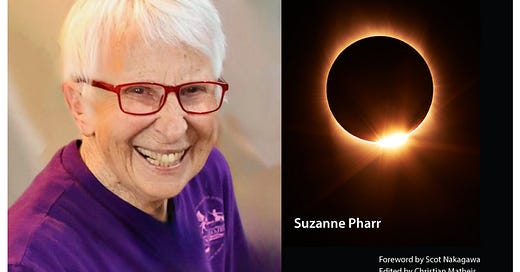A Different Way of Seeing
Suzanne Pharr has a gift for asking questions that shift your perspective and open up new ways of seeing the world. When I interviewed her recently on the Wide Awake America radio show, one idea she shared stayed with me. It was both practical and visionary: What if we reimagined old church buildings as liberation hubs? Spaces where communities could gather, organize, teach, and dream together?
Reclaiming What Has Been Hollowed Out
In a time when public space is vanishing and digital connection cannot replace human touch, her idea lands with quiet clarity. It is not just about buildings. It is about reclaiming what has been hollowed out—community, purpose, belonging.
You can listen to the full interview with Suzanne Pharr here. Click here to download In the Time of the Right: Reflections on Liberation (Second Edition).
A Voice From the Front Lines
A seasoned organizer, writer, and mentor to generations of activists, Pharr brings a deep well of experience from the front lines of feminist, anti-racist, and LGBTQ movements. She is the author of Homophobia: A Weapon of Sexism and the newly reissued In the Time of the Right: Reflections on Liberation. First published in 1996, the book predicted the rise of right-wing authoritarianism and continues to offer guidance on resisting and building new systems rooted in justice.
We Survive Together or Not at All
At the heart of Pharr’s message is a powerful call for cross-ideological organizing. In times of disaster or economic collapse, she reminds us that neighbors must support neighbors, regardless of political affiliation. “We survive together or not at all,” she said. Her call is not for naïve unity, but for strategic compassion grounded in shared material needs and the belief that transformation begins with relationship.
What a Week in the Woods and a Cruise Taught Me
I came into our conversation not long after a trip aboard a radically inclusive cruise. It was a floating, impromptu utopia where joy, curiosity, and mutual respect created a living model of how diverse communities can thrive. That experience set the tone for our talk about building resilient, inclusive communities at a time when the forces of division are growing more stark and aggressive.
Connection Is Survival
Pharr emphasized that building community is not just a good idea; it is essential. She pointed to the deep isolation many felt during the pandemic and how authoritarianism thrives by breaking our relational bonds. "Without that sense of connection, we don't survive," she said.
Authoritarianism Wears Many Outfits
In the Time of the Right argues that the political Right’s rise did not come out of nowhere. Pharr traces its ascent through decades of organizing, fueled by racism, sexism, and homophobia, all weaponized to consolidate power. She reminds us that authoritarianism does not always arrive in uniform. Sometimes it is wrapped in religion, law-and-order slogans, or the bureaucratic language of nonprofit systems. “We are living in a time when our silence and lack of resistance can be taken as compliance,” she writes.
Rooted in Real-World Struggle
Pharr’s understanding of systemic injustice came through practice, not just theory. Her work in the domestic violence movement and alongside Black women organizers shaped her analysis of power and solidarity. She writes that liberation cannot come from single-issue silos. It must be built on intersectionality, care, and collective action.
The Work Ahead Starts Face to Face
She believes our next chapter depends on returning to the basics of organizing. In-person engagement, shared spaces, and intentional relationships are key. Libraries and old churches, she suggests, can become organizing hubs. “We need organizing schools where people learn how to work face-to-face,” she said.
Freedom Schools, Not Culture Wars
Pharr also warns that public education is under existential threat. Rather than defend a broken system, she challenges us to build something better. She draws inspiration from Freedom Schools and mutual aid networks that reflect the values we hope to live by. "We have to rebuild—not the old ways, but something better."
Preparing for the Next Conversation
Pharr reminds us that preparing for change also means preparing to welcome people back. “You don’t ignore your neighbor’s screams because they once had a Trump sign in their yard,” she said. In moments of crisis, we must reach for our shared humanity and organize across differences.
She holds this belief not out of naïveté, but from experience. Black women organizers who worked alongside her didn’t just teach her about systems of oppression, they extended grace as she confronted her own privilege. That generosity shaped her conviction that transformation is possible, and that real change begins with relationship, even across painful divides.
A Map for the Moment
In the Time of the Right is both a warning and a guide. It names the forces that stand in the way of liberation and helps us remember the well of resistance, memory, and creativity we can draw from. As Pharr makes clear, even as the Right dismantles, we must build. Even as they isolate, we must connect. Even as they try to divide, we must imagine (and practice) a world where we all belong.
Contact Suzanne at suzannepharr.com.
Real quick, before you go
Thank you for being part of the Wide Awake America community. Every listen, read, and share helps us reach more people and grow this all-volunteer project.
We’re aiming for 3,000 subscribers and 200 paid supporters to keep the momentum going—and we’re getting there thanks to you.
A heartfelt thank you to everyone who’s chipped in to help cover the costs of equipment, software, and the everyday expenses of running a newsletter, radio show, and podcast. Your support truly helps us grow daily.
If you’re looking for a simple way to help us grow, here are two that make a real difference:
Share our stories with someone who needs facts, perspective and honest optimism.
Invite a friend to subscribe





